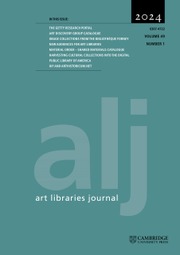Welcome to this special issue of the Art libraries journal, dedicated to critical art librarianship. For more than a decade, librarians in North America and elsewhere have increasingly engaged in the use of theory as a tool to question and redefine existing professional discourses and practices. In parallel, these critical approaches have also repositioned social justice as a core responsibility and goal of librarianship. The concepts of critical librarianship generally, and critical art librarianship in particular, are explored in this issue through multiple perspectives: theorisations, case studies and reflections, as well as accounts of activism.
Many of the articles included here follow on from two recent conferences, ‘Towards a critical (art) librarianship: theories and practices’ held at Chelsea College of Arts, University of the Arts London, in May 2018Footnote 1, and the ARLIS UK & Ireland Annual Conference, held at the Architectural Association, London, in July 2018Footnote 2. We are grateful to our contributors for their generosity and willingness to reframe their presentations for this issue, and to pose difficult questions, share their views and propose answers. The ALJ has an ongoing interest in critical, radical and activist approaches within art librarianship, and would welcome proposals for further contributions (articles, reviews, opinion, etc.) on these and related subjects, particularly from voices currently under-represented or marginalised in the professional literature and debate.
Emily Drabinski opens the issue with a powerful proposition of the key principles and concepts of critical librarianship, first presented as the conference keynote at ‘Towards a critical (art) librarianship: theories and practices’. There are strands that run through several articles, including an urgent desire, in our current political climate, for libraries to critically examine their practices and assumptions to support social change, and some ambiguities in relation to histories of radicalism and political activism. How does critical librarianship operate in a neoliberal and market driven environment? Katherine Quinn interrogates what non-compliance means in the context of UK HE librarianship and considers that this can happen ‘softly and expansively’ as everyday actions and critical reflections.
Critical librarianship is about the people who work in our libraries and archives. Amanda Meeks discusses individual and professional identities, the art librarian’s relationship to art and making, and the aim of solidarity with critically engaged creative practitioners. These articles also highlight structural inequalities that are slow to change and that challenge any concept of criticality, including the whiteness of the profession.
Rather than directly address the organisation of knowledge systems in libraries, Melissa Adler takes a tangential approach in her article (keynote at the ARLIS UK & Ireland Conference 2018) ‘inhabiting and re-inscribing spaces using techniques and language from outside those systems’ to introduce Pamphila, an early feminist cataloguer, and ways of organising knowledge that privilege beauty and pleasure, through weaving and thread based analogies, along with historical accuracy and usefulness. Siân Edwards, one of the founders of Art+Feminism, reflects in her interview on the development of the project, as a critically informed intervention in the digital space aimed at building and sustaining an intersectional feminist, social justice focussed community working with the Wikipedia.
Laurence Byrne, Leila Kassir, Hudda Khaireh and Heiba Lamara describe in their article a workshop held at Senate House, University of London, developed collaboratively by librarians and artists, and aimed at non-library-card-holders, to demystify library processes and spaces, and to provide a framework for the critiquing of knowledge organisation in the library. Jess Crilly surveys the gains of engagement with critical librarianship in an HE arts library context, describing exploratory practices in information literacy and collection management, and discusses some possibilities and challenges in moving from insight to impact. Closing the special issue, Leo Appleton poses in his Viewpoint the question ‘Is critical art librarianship actually a thing?’ and works through theories, definitions, and personal reflections to conclude that it is, and a good thing too.
Finally, we would like to thank Jennifer Ferretti and Andrew Wang, coordinators of ARLIS/NA Critical Librarianship SIGFootnote 3, Amanda Meeks and Eamon Teawell for their helpful suggestions and feedback.

